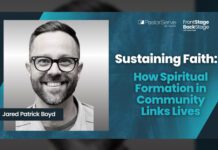Functional Loss. This type of loss is when our bodies or minds—through illness, injury, or aging—do not function the way they once did. It can be as simple as not being able to see or hear as well. I notice many people resist purchasing reading glasses or flatly refusing to get hearing aids even when necessary. Then there are the more dramatic functional losses that occur suddenly because of a stroke, injury, or cancer diagnosis. When people suddenly can no longer do what gave them pleasure or brought a sense of accomplishment, the grief can be substantial. While some may be grateful to be alive, we must remember that their gratitude is also paired with grief.
Role Loss. We all find a sense of purpose and self-worth through the many roles we play in our lives. Whether it be a personal role such as husband, wife, father, mother, son or daughter or a professional role such as pastor, counselor, teacher, doctor, lawyer, etc., we may not realize how much this position means until it is gone. Role loss has many circumstances, but two of the most common are the loss of a professional role resulting from retirement and the loss of a personal role when parents are left with an “empty nest” once their children grow up and leave home. People must recognize their feelings as part of a normal grief response and then get assistance with discovering who they are in their new roles.
Systemic Loss. While we understand grief as an individual experience, many people do not realize it is also a collective experience. Any system, such as a family, church, company, community, or even a nation, that experiences a collective loss will also have collective or systemic grief. The loss and ensuing grief will impact the individual as well as the whole and how it functions. I have found that if people in a system cannot grieve together, it can tear them apart, which is why marriages become so vulnerable following the death of a child. Helpers need to address both systemic and individual loss and take steps to enhance a system’s ability to grieve together.
Intrapsychic Loss. This is the clinical term for “the death of a dream.” It is the loss of someone or something that a person never really had… the loss of what was hoped for and expected… the loss of a vision or plan for the future. Intrapsychic loss is also one of the most challenging types to grieve because most people are not aware that they can grieve or are grieving. The pain of infertility can cause the loss of one’s dream of carrying and giving birth to a child. An untimely injury can cost an athlete a gold medal or a career in the sport he or she loves. Intrapsychic loss can also be an unfulfilled dream for a loved one, a business, or a relationship, causing us to grieve once we realize that dream will never come true. Allowing people to voice those dreams and the pain of losing them can aid in their recovery—and with God’s help, they can build new dreams.
We can learn some valuable lessons from Job and those who tried to help him. Job’s friends came to be with him and sat in silence for some time, which was very helpful. It was not until they opened their mouths and tried to figure out why Job was suffering that they made a mess of things. Although it is normal for sufferers to ask “why,” we should not feel the need to answer those questions or even try. What they need is for us to sit with them in silence while they ask questions.
It was okay for Job to cry out to God in his pain. He never blamed God or turned his back on Him. Not everyone, even committed Christians, will be able to have the faith of Job. I have sat with many who have been angry with God and some who even temporarily turned their backs on Him. However, those who recover almost always find their way back to God by allowing Him to offer them comfort. Like Job, many find that if they trust God, He will be faithful in mending their broken hearts and blessing them in ways in which they never dreamed.
This article originally appeared in Christian Counseling Today, Vol. 24 No. 4. Christian Counseling Today is the flagship publication of the American Association of Christian Counselors. To learn more about the AACC, click here.
Reference
Ellers, J.C., and Ellers, K. (2019). Grief Following Trauma (2nd ed.). Crystal Lake, IL: Institute for Compassionate Care and International Critical Incident Stress Foundation.











